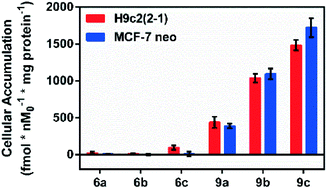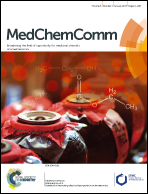67Ga-metalloprobes: monitoring the impact of geometrical isomers on accumulation profiles in rat cardiomyoblasts and human breast carcinoma cells†
Abstract
Geometrically similar monocationic gallium(III) complexes and their radiolabeled SPECT counterparts were obtained from Schiff base precursor ligands using ligand exchange reactions to evaluate the impact of cis and trans-isomers on their cellular accumulation profiles in rat cardiomyoblasts (H9c2(2-1)) and human breast carcinoma (MCF-7neo) cells. 67Ga-metalloprobes comprising trans-phenolates showing an overall octahedral geometry and exhibiting uniform spatial distribution of positive charges on their molecular surface show steady-state accumulation in H9c2(2-1) and MCF-7neo cells, and localize in the mitochondria of the cells. Importantly, the surrogate geometrically similar and monocationic metalloprobe counterparts possessing the cis arrangement of phenolates do not show cellular uptake in H9c2(2-1) and MCF-7neo cells. Exploiting their modest fluorescent traits, live cell imaging indicates that trans-isomers of metalloprobes localize within the mitochondria of cells following their penetration, thereby indicating the excellent correlation of radiotracer data and live-cell microscopy results. Overall, these results indicate that the cell uptake profiles of metalloprobes within this class are mediated by the spatial distribution of charges over their molecular surface and hydrophobicity.


 Please wait while we load your content...
Please wait while we load your content...